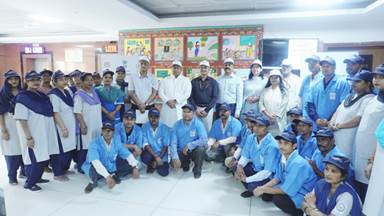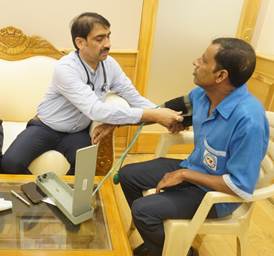Minister of State for Education & Development of North Eastern Region, Dr. Sukanta Majumdar, inaugurated a Safai Mitra Suraksha Shivir at Shastri Bhawan, New Delhi, by distributing Swachhata Kit to nearly 100 sanitation workers at the beginning of Swachhata Hi Seva fortnight (17 September – 2 October 2024). Secretary, Department of Higher Education, Shri K. Sanjay Murthy; Additional Secretaries, Shri Anandrao V. Patil and Shri S K Barnwal; and other officials of the Ministry were also present at the event.
Dr. Majumdar also administered a Swachhata Pledge to everyone. A Swachhata anthem was also played during the event. The Suraksha Kits include a shirt, cap, hand towel, shoes, gloves, masks, and sweets.

Dr. Majumdar, in his address, expressed gratitude to Prime Minister Shri Narendra Modi for making Swachhata an integral part of everyone’s life and turning it into a Jan Bhagidari initiative. He noted that the Prime Minister has inspired the adoption of Swachhata in daily life, extending its reach to every corner of the country. He also highlighted how the provision of toilets in every household has helped save millions of children from communicable diseases. Dr. Majumdar emphasized the need to adopt Swachhata in every sphere of life, going beyond mere tokenism.



Shri K. Sanjay Murthy, in his address, emphasized that everyone must commit to adopting Swachhata in their daily routines to lessen the burden on Safai Mitras. He mentioned that, through a whole-of-government approach, the requirements of sanitation workers have been mapped, and 6-7 major government initiatives will be made available to them. Shri Murthy also noted that Higher Education Institutions and Autonomous Bodies are actively participating in the three main pillars of SHS 2024: Swachhata Ki Bhaagidari; Sampoorna Swachhata, including Swachhata Lakshit Ekayi; and Safai Mitra Suraksha Shivirs. He urged everyone to participate in the ‘Ek Ped Maa Ke Naam’ initiative and plant a sapling.
Initiated in 2014 by Prime Minister, Shri Narendra Modi, Swachh Bharat Mission is celebrating its 10th anniversary this year. To mark this significant milestone, the Swachhata Hi Seva (SHS) 2024 campaign will run from today until October 1st, with the theme “Swabhav Swachhata – Sanskaar Swachhata”. The campaign will culminate with the Swachh Bharat Diwas celebrations on 2nd October.

All Higher Education Institutions and Autonomous Bodies under the Ministry of Education are actively participating across the three main pillars of SHS 2024. The first pillar, Swachhata Ki Bhaagidari, focuses on Public Participation, Awareness, and Advocacy. Higher Education Institutions have planned activities such as planting, naming and adoption of saplings under the ‘Ek Ped Maa ke Naam’ initiative, organizing cleanliness runs, administering cleanliness pledges, hosting waste-to-art/poster-making/slogan competitions, and conducting awareness drives on cleanliness.
The second pillar, Sampoorna Swachhata including Swachhata Lakshit Ekayi, includes extensive cleanliness drives with janbhagidari. Some Higher Education Institutions have adopted Cleanliness Transformation Units (CTUs) identified at the block level by Urban Local Bodies (ULBs), aligning with the ‘Whole of Government’ approach; others have identified their own CTUs in both urban and rural areas.
The third pillar is Safai Mitra Suraksha Shivirs, under which Single-window health and welfare camps are being organised for SafaiMitras for preventive healthcare screening/check-ups and to enable linkages with various welfare schemes of Central and State Government. Higher Education Institutions (HEIs) have planned health check-up camps, events to honour SafaiMitras, and enable access to government schemes.
HEIs are also taking up various activities such as
• Sampoorna Swachhata of college/hostel canteens: Implementing waste segregation at source, renovate kitchen area to minimise wastage, devise SOPs for zero waste and participatory cleaning.
• Eco-Friendly Supplies & Pledge: Encourage the use of eco-friendly supplies like recycled pens, paints, and canvases, along with a commitment to continue.
• Public Art Campaigns: Develop public art projects, like murals or street art, spreading messages of cleanliness and sustainability.
• Nukkad Natak on Waste Awareness: Perform Street plays (nukkad natak) in communities to raise awareness about waste management and recycling
• So far, 138 activities have been planned by DHE and its institutions during this fortnight. List of activities is enclosed.
• In the past decade CFHEIs/ ABs have contributed to pushing the technology frontier for sanitation related interventions through design thinking, use of cutting-edge technology and process re-engineering.
• In pursuit of innovative, low-cost sanitation solutions, leading Higher Education Institutions (HEIs) in the country have undertaken several noteworthy projects, many of which are funded by the Ministry under Swachhata Action Plan (SAP).
• IIT Roorkee has created a low-cost filter (priced at Rs. 2,000) designed to treat arsenic and fluoride in groundwater. This filter has been in use at the Netaji Subhash Chandra Bose Residential Hostel in Haridwar since September 2023, benefiting 100 residents by reducing health risks associated with contaminated water.
• Meanwhile, IIT Kharagpur has developed a bio-electric toilet that generates electricity during the treatment of human waste.
SafaiMitra Suraksha Shivir
Starting today, a SafaiMitra Suraksha Shivir will be conducted. In this camp, a physician and gynaecologist have been engaged to deliver talk on overall wellbeing and fitness especially in the context of occupational hazards faced by Safai Mitras and awareness regarding best practices in menstrual hygiene. Health screening and counselling sessions will be carried out for all Safai Mitra over three days. Baseline survey of sanitation workers will be carried out to raise awareness about entitlements under various government schemes and facilitate documentation to avail such entitlements.
Waste-to-art installation using repurposed waste
Students from Jamia Millia Islamia will create art from waste materials such as plastic sheets, aluminium sheets, condemned furniture and obsolete electronics. This artwork will be displayed at a prominent location in Shastri Bhawan.
Beautification of Shastri Bhawan premises and creation of selfie points
The students will carry out wall and sheet paintings at select locations within the premises. Dumping sites (for condemned furniture/appliances) will be cleaned up, beautified and converted into selfie-points to celebrate the transformation.
Street Vendor Sensitization
The Ministry will engage with street vendors outside Shastri Bhawan to educate them on waste segregation at source and to designate waste collection sites. Colour-coded waste bins will be installed outside Shastri Bhawan, and vendors and customers will be sensitised on proper waste disposal practices.

Comments are closed.